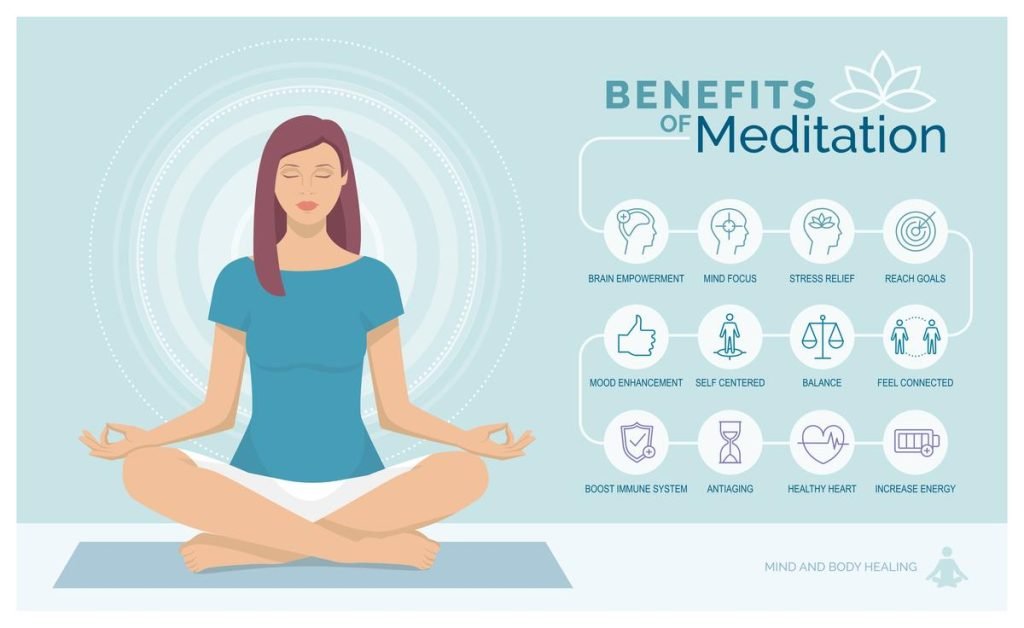Table of Contents
Introduction
In today’s fast-paced society, many people find it difficult to get a good night’s sleep. Stress, anxiety, and the continual hustle and bustle of life frequently leave us tossing and turning in bed, desperate for a good night’s sleep. Fortunately, meditation can be a great ally in your quest for pleasant sleep. In this comprehensive article, we’ll look at how meditation and sleep are connected, as well as four basic meditation techniques that can help you get the restorative sleep you deserve.
Meditation and Sleep: A Perfect Combination
Meditation and sleep have a close and mutually beneficial relationship. While meditation is most known for its ability to calm the mind and relieve stress, it also helps to promote healthy sleep. Let us highlight the link between meditation and sleep:
- Meditation and Sleep Quality: Research has shown that regular meditation improves overall sleep quality. When you meditate, your mind clears of rushing thoughts, making it simpler to fall and stay asleep throughout the night.
- Stress Reduction: Stress is a key cause of sleep problems. Meditation is a great method for stress reduction, which can contribute to better sleep. When you are less worried, you are more likely to fall asleep deeper and more peacefully.
- Anxiety Management: Because racing thoughts and worries make it difficult to rest, anxiety frequently keeps people awake at night. Meditation promotes mindfulness and a sensation of peace, making it easier to let go of stressful thoughts before going to bed.
- Improved Sleep Patterns: Meditating on a regular basis can help you manage your sleep patterns. Developing a regular meditation practice helps indicate to your body that it’s time to unwind and prepare for sleep.
Now that we’ve established the fundamental relationship between meditation and sleep, let’s look at four easy meditation techniques that may clear the path to a restful night’s sleep.

Technique 1: Mindfulness Meditation
Mindfulness meditation is a popular type of meditation in which you devote nonjudgmental attention to the present moment. It is a fantastic technique for calming the mind, lowering tension, and getting your body ready for sleep.
To practice mindfulness meditation for sleep, do the following:
- Look find a peaceful, relaxing spot to sit or lie down.
- To relax, close your eyes and take a few deep breaths.
- Pay attention to your breathing. Feel the breathing and exhalation movements.
- If your thoughts wander, gently bring them back to your breathing without condemnation.
- Continue this practice for 15-20 minutes before going to bed to prepare your thoughts for sleep.
You can calm your mind into a state of relaxation conducive to deep sleep by including mindfulness meditation into your nighttime practise.

Technique 2: Progressive Muscle Relaxation
Progressive muscle relaxation is a meditation practice that involves tensing and then releasing different muscle groups in your body in a systematic manner. This practice can aid in the release of bodily stress, making it easier to sleep.
To practice gradual muscular relaxation for sleep, do the following:
- Make yourself at home in bed.
- Tense the muscles in one section of your body, beginning with your toes, and hold for a few seconds.
- Relax the muscles and concentrate on the sensation of relaxation in that location.
- Continue this technique all the way up your body, from your feet to your head.
- Your entire body should be deeply relaxed by the time you reach your head.
This meditation practice not only prepares your body for sleep, but it also improves your body awareness, assisting you in identifying and releasing any areas of stress that may be interfering with your ability to sleep.
Technique 3: Sleep Meditation Guided
For people who find it difficult to meditate on their own, guided meditation for sleep is a wonderful choice. You can listen to a pre-recorded meditation that walks you through a relaxation technique intended specifically to promote healthy sleep.
To practice guided meditation for sleep, do the following:
- Locate a quiet, comfortable area to lie down.
- Put on your headphones and listen to a guided meditation for sleep.
- Adhere to the meditation guide’s directions.
- Allow yourself to relax and let go as you follow the relaxing instructions.
There are various guided meditation applications and online resources that provide a variety of sleep-specific meditations. Explore various possibilities to find the one that speaks to you the most.
4th Technique: Yoga Nidra
Yoga Nidra is a highly soothing meditation practice that generates a state of conscious relaxation. It is also known as yogic slumber. It is very useful for enhancing sleep quality and minimizing insomnia.
To do Yoga Nidra for sleep, follow these steps:
- Lie down, preferably on your back, in a comfortable position.
- To relax, close your eyes and take a few deep breaths.
- Use a recorded script or a guided Yoga Nidra session.
- A systematic body scan and guided visualization put you into a state of profound relaxation during the practice.
Yoga Nidra not only promotes deep relaxation but also self-awareness and inner serenity, making it an ideal alternative for people looking for a good night’s sleep.

Conclusion
Meditation appears as a potent ally in the pursuit of beautiful sleep. Meditation and sleep have an intimate relationship, as seen by the multiple benefits it provides, such as better sleep quality, stress reduction, anxiety management, and sleep pattern regulation.
You can harness the transformational power of meditation to ensure a pleasant and refreshing night’s sleep by adopting the four simple meditation techniques mentioned in this guide: mindfulness meditation, progressive muscle relaxation, guided meditation for sleep, and Yoga Nidra.
When it comes to meditation, remember that consistency is essential. The best outcomes will come from consistent practice. So, begin your meditation journey today, and allow meditation’s soothing embrace guide you to the wonderful sleep you deserve.